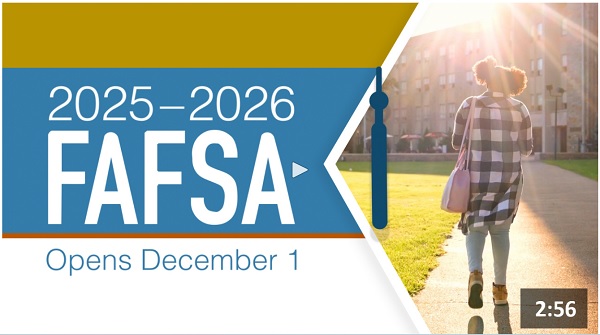[Video] 2025-2026 FAFSA Launch Set for December 1
The FAFSA for the 2025–2026 school year is set to open on December 1st, 2024. This is the second year in a row that the form has been delayed from its typical October 1st open date, and it comes on the heels of last year's FAFSA Simplification Act, which ushered in some of the largest changes to the FAFSA in the past two decades.
The FAFSA (Free Application for Federal Student Aid) must be submitted each year for students to be eligible for federal financial aid, and sometimes, college-based aid as well.
This quick video shares some helpful information about filing the FAFSA (click to watch):
How to File the FAFSA
The best way to file the FAFSA is online.To file it, parents and students each need their own FSA ID – a username/password combination that functions as a legal signature, and connects the FAFSA to the IRS Data Retrieval tool to make the filing process more streamlined. You can create an FSA ID online, and the same ID can be used for all years of college.
What Information Does the FAFSA Require?
The FAFSA requires two key types of information: income and assets.
For income, the 2025–2026 FAFSA will look back two years and rely on information from your 2023 federal income tax return. This data will be automatically imported from the IRS.
For assets, the FAFSA will use the value of your assets as of the date you submit the form.
The FAFSA analyzes a family’s income and assets to calculate a figure called the “Student Aid Index,” (SAI) a benchmark that measures aid eligibility.
Colleges then use the Student Aid Index to craft a financial aid package that attempts to meet a student’s financial need. Colleges are not obligated to meet 100% of a student’s need.
Why File the FAFSA?
All students who file the FAFSA are eligible for an unsubsidized federal Direct Loan, regardless of financial need. But students who demonstrate need on the FAFSA are eligible for a subsidized Direct Loan, which means the government pays the interest that accrues during school and any loan deferment periods. Students with a high level of financial need may also qualify for a federal Pell Grant.
Note that filing the FAFSA does not require students to accept any loans offered ― it just gives students
the option to accept them if they need to.
Some colleges might also require the FAFSA before awarding students certain college-based aid, including merit scholarships and grants, so filing it can be beneficial, even if a student does not plan on taking out any federal loans, AND even if the parents make a substantial income.
Want more information on the FAFSA? See this post for some common FAFSA myths and answers to common questions.
Need help planning for college? Contact our office for a free college planning strategy session!
Disclaimer:
The information presented here is for educational purposes only and is not a solicitation for the purchase of any financial product. The statements and opinions expressed are those of the author and are subject to change at any time. All information is believed to be from reliable sources; however, presenting financial professional makes no representation as to its completeness or accuracy. This material has been prepared for informational and educational purposes only. It is not intended to provide, and should not be relied upon for, accounting, legal, tax or investment advice.

